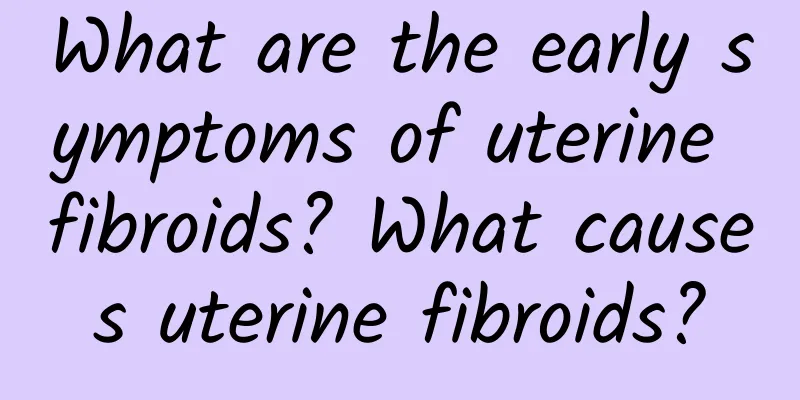What are the early symptoms of uterine fibroids? What causes uterine fibroids?

|
What are the early symptoms of uterine fibroids? What causes uterine fibroids? Uterine fibroids are a common gynecological disease caused by abnormal growth of smooth muscle tissue in the uterine wall. Uterine fibroids are often asymptomatic, and many patients only realize they have the disease during a physical examination. However, some patients will experience symptoms in the early stages of uterine fibroid development, which is very important for early diagnosis and treatment. 1. Dysmenorrhea and abnormal menstruation Dysmenorrhea is one of the most common symptoms of premenstrual uterine fibroids. Patients often feel severe abdominal pain during their menstrual period, even accompanied by nausea and vomiting. In addition, some women experience abnormal menstrual flow and cycles during their menstrual period. Their menstruation may become more abundant and prolonged, and they will experience more frequent menstrual cycles. These abnormal menstrual symptoms may indicate the presence of uterine fibroids. 2. Frequent urination and difficulty urinating The growth of uterine fibroids can put pressure on the bladder, causing frequent urination and difficulty urinating. You may feel the urge to urinate frequently but not urinate much, or you may feel discomfort and difficulty urinating. These symptoms may be caused by uterine fibroids. Pelvic pain and pressure As uterine fibroids grow and press on nearby organs, you may experience pelvic pain and pressure. This pain may come and go or be constant. You may feel a sense of heaviness and discomfort in your lower abdomen. If you experience these symptoms, especially if they are accompanied by other discomforts, such as indigestion and difficulty having a bowel movement, consult your doctor. 4. Infertility or miscarriage Uterine fibroids may affect conception and embryo implantation, leading to infertility or multiple miscarriages. Some patients experience spontaneous abortions soon after finding out they are pregnant, which may be caused by uterine fibroids. If a patient has been trying for a while and still has not conceived or has had multiple miscarriages, the possibility of uterine fibroids should be considered. 5. Pressure on the digestive system As uterine fibroids grow, they may compress the digestive system, causing indigestion and constipation. Patients may experience bloating, stomach discomfort, and loss of appetite. These symptoms may affect normal eating and bowel movements, which in turn affects the body's nutrition and health. Summarize: There are many early symptoms of uterine fibroids, including dysmenorrhea and abnormal menstruation, frequent urination and difficulty urinating, pelvic pain and pressure, infertility or miscarriage, and compression of the digestive system. These symptoms may not all appear, and different patients may have different symptoms. If any of the above symptoms occur, especially if multiple symptoms occur at the same time, you should seek medical attention in time for further examination and diagnosis. Early detection and treatment of uterine fibroids can avoid its impact on quality of life and fertility. |
<<: What to eat to eliminate uterine fibroids? What to eat to recover quickly from uterine fibroids?
Recommend
Eat happily so that you can lose weight last! Are you tired of losing weight? Try the new carb cycling diet
"Breaking ketosis" and "exploding ...
How to test yourself whether you are born without vagina
Many women do not know their own physiological st...
What medicine can eliminate right ovarian cyst?
It is usually difficult to completely eliminate r...
How to recover quickly from threatened abortion
Women of childbearing age will basically delay ch...
What health products can I take if I am born without vagina?
What kind of health supplements can people with c...
How is threatened miscarriage treated?
How is threatened miscarriage treated? Threatened...
Green dietary fiber aloesin exceeds the standard by 1,000 times, doctor says may cause cancer
The "Green Dietary Fiber Capsules", whi...
Why does pelvic peritonitis always recur?
The incidence of pelvic peritonitis has increased...
Woman's thigh swelled after taking fat-reducing injection: Department of Health: Not approved
Many women want to lose weight but are too lazy t...
What is menopausal depression?
Medically, the period between 45 and 55 years old...
Analysis of the causes of mild cervical erosion
As a common type of cervical erosion, mild cervic...
Healthy low-fat meals that can also be made in an electric cooker! "Steamed Chicken Breast with Lemon" is nutritious and delicious
Even if you don’t have a frying pan or oven, you ...
How to avoid pain during curettage? Why does curettage hurt?
Does it hurt to have a curettage? How to avoid it...
You won’t gain weight by eating at noodle shops or braised food stalls! Eliminate high-calorie food mines
If you want to lose weight successfully, in addit...
Can third-degree cervical erosion heal itself? The most serious degree
Gynecological diseases have always been a common ...









